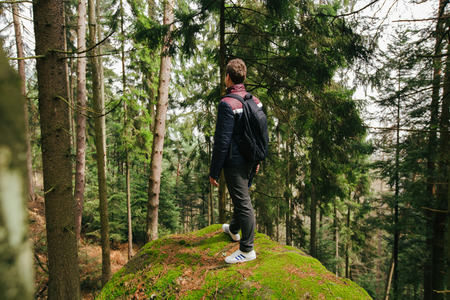Exploring the Great British Outdoors: A Changing Landscape
There is a certain poetry to camping in the UK—a ritual rooted in rolling out your tent beneath ancient oaks, waking to the gentle chorus of robins, and sipping tea as dawn mist dances across fells and meadows. From the tranquil waters of the Lake District, veiled each morning in ethereal fog, to the rugged Cornish cliffs where salty breezes whip through wild grasses, camping here is more than an escape; it’s a love letter to Britain’s living tapestry. Yet beneath this timeless beauty, subtle shifts are at play. Climate change—so often spoken of in distant, abstract terms—is quietly redrawing the familiar contours of our beloved landscapes. Warmer winters bring unexpected blooms and muddier trails; summer droughts parch once-verdant valleys. As campers pitch their tents on sodden ground or seek shelter from sudden storms, the impact on cherished traditions becomes ever more tangible. In every sunrise over heathered moors and each star-filled night by a pebbled shore, there is a growing awareness that the future of British camping—and the biodiversity that enriches it—hangs delicately in the balance.
Nature in Flux: The Impact of Climate Change on UK Biodiversity
Wandering through ancient woodlands or pitching a tent beside a quiet stream, campers in the UK have always been intimate witnesses to the subtle rhythms of the seasons. Yet, these rhythms are shifting. The once-predictable emergence of native bluebells—those delicate harbingers of British spring—now often arrives weeks ahead of schedule. Meanwhile, hedgehogs, icons of our countryside, are venturing into new territories as their habitats morph and food sources change.
Shifting Patterns in Flora and Fauna
The fingerprints of climate change are everywhere, subtly but inexorably redrawing the living map of Britain. Warmer winters and unpredictable rainfall patterns mean that plant life is blooming earlier and for longer periods, unsettling pollinators and threatening the fragile synchrony that defines woodland life. Mammals, birds, and insects alike find themselves navigating unfamiliar landscapes—a challenge not just for them, but for those who seek to enjoy nature responsibly.
Observed Changes in UK Wildlife Due to Climate Change
| Species | Traditional Pattern | Recent Changes Observed |
|---|---|---|
| Bluebell (Hyacinthoides non-scripta) | Blooms late April to May | Now blooming up to 2-3 weeks earlier |
| Hedgehog (Erinaceus europaeus) | Hibernates November–March | Shorter hibernation; exploring new areas |
| Swallow (Hirundo rustica) | Migrates to UK in April | Earlier arrivals noticed since 2000s |
| Bumblebee (Bombus spp.) | Active March–October | Extended activity into winter months |
The Camper’s Role: Witness and Participant
The modern camper does more than simply observe these changes—they are part of this living landscape. With every footprint on dewy grass or discarded wrapper at a beauty spot, there is a subtle impact. Sometimes, camping practices can contribute inadvertently to environmental stress: trampling wildflowers, disturbing nesting sites, or introducing invasive species on muddy boots and gear. Conversely, those who tread lightly—following Leave No Trace principles and supporting local conservation efforts—can help protect the very wonders they come to experience.
For many Britons, camping is more than a pastime; it is an expression of belonging and reverence for the land. As our climate alters the tapestry of wildlife around us, it invites a deeper reflection on how each outdoor adventure shapes the future of these cherished places—and how we might act as stewards rather than mere spectators.

3. Sustainable Camping: A New Ethos for British Campsites
Across the wild moors of Yorkshire and the gentle, mist-laced valleys of Wales, a quiet revolution is unfolding in Britain’s beloved campsites. The traditional charm of camping—crackling campfires, morning dew on canvas, the whistle of a kettle—is now being thoughtfully woven with a fresh, eco-conscious ethos. Campground owners and wild campers alike are embracing sustainable practices that honour both the land’s ancient rhythms and its vulnerable future.
Eco-Friendly Innovations in Every Corner
From composting loos hidden beneath hawthorn hedges to solar showers warmed by rare English sunshine, UK campsites are becoming laboratories of low-impact living. Many sites now favour biodegradable soaps, encourage guests to bring reusable containers, and even offer pitches only accessible on foot or by bicycle, reducing the carbon footprint of each adventure. These green touches transform every stay into an act of stewardship, not just leisure.
Preserving Biodiversity Beneath Canvas Skies
Wildflower meadows left uncut attract pollinators, while hedgerows burst with life, providing corridors for dormice and blackbirds. Campsite managers collaborate with local conservationists to rewild corners of their land—planting native trees, restoring ponds, and fostering habitats where nature can quietly thrive alongside human visitors. The magic of waking to birdsong is no accident; it’s a testament to these small but mighty interventions.
A Culture Rooted in Respect
This new ethos is about more than ticking green boxes—it’s a shift in culture. British campers are encouraged to tread lightly: leave-no-trace policies are commonplace, firewood is often sourced locally or provided from managed woodlands, and recycling facilities are now standard rather than rare. The joy of sharing stories around the fire remains, but so too does the shared responsibility for the land beneath our boots.
4. Local Voices: Stories from the Campsite Stewards and Wild Campers
The heart of Britain’s green spaces beats strongest in the tales told by those who nurture, traverse, and cherish them daily. Across the rolling fells of the Lake District, among the whispering woods of the New Forest, and along Cornwall’s rugged coastlines, campsite owners, wild campers, and local conservationists stand as guardians—each with unique perspectives on adapting to a changing climate.
Weathering the Unpredictable: Adapting to Change
“We used to rely on the seasons being fairly consistent,” shares Emily, who manages a family-run campsite in Snowdonia. “Now, summer can bring torrential rain or drought in equal measure.” For many stewards, investing in sustainable drainage systems and resilient native plantings has become essential. Meanwhile, wild campers have become adept at reading shifting forecasts and packing for all seasons—sometimes within a single weekend.
| Stakeholder | Main Concerns | Adaptation Strategies |
|---|---|---|
| Campsite Owners | Unpredictable weather impacting bookings and land quality | Eco-friendly drainage, solar showers, robust tent pitches |
| Wild Campers | Personal safety, leave-no-trace ethics | Weatherproof gear, flexible plans, environmental stewardship |
| Conservationists | Biodiversity loss, habitat disturbance | Public education, habitat restoration projects |
The Responsibility of Guardianship
Beneath their tales runs a common thread—a deep sense of responsibility. “We are caretakers for future generations,” explains John, a volunteer ranger on Dartmoor. “Our choices now will shape what remains for tomorrow’s children.” Many campsite owners have introduced nature walks and biodiversity workshops to inspire visitors to tread lightly. Conservationists work tirelessly to restore wildflower meadows or rewild hedgerows that provide sanctuary for birds and pollinators.
Voices from the Field
- “There’s nothing quite like waking up with skylarks overhead—and knowing your presence hasn’t left a mark.” – Sarah, wild camper on the Yorkshire Moors.
- “We’ve seen more people curious about how they can help—from rubbish clean-ups to planting native trees.” – Tom, owner of an eco-campsite in Devon.
Towards Shared Stewardship
This tapestry of voices reveals a growing culture of shared stewardship across Britain’s wild places. Whether through mindful camping practices or innovative site management, local champions are guiding us towards a future where adventure and protection walk hand in hand—ensuring that these landscapes remain vibrant havens for both people and wildlife.
5. Innovations and Traditions: Building a Greener Future for UK Camping
The British countryside has always been a place to find peace beneath whispering trees and vast, ever-changing skies. Yet, as the climate shifts and biodiversity faces new pressures, our beloved camping rituals are being gently reshaped by innovation. Across the UK, creative solutions are blossoming at the heart of the camping experience, bridging the gap between tradition and sustainability.
Solar-Powered Comforts Under British Skies
Picture a classic British campsite: rolling meadows, patchwork fields and wild hedgerows. Today, these timeless settings are quietly powered by the sun. Solar panels now nestle beside bell tents or atop campervans, charging lanterns that cast a gentle glow after dusk or keeping your morning tea piping hot. Far from disrupting the tranquil landscape, these eco-friendly amenities blend into their surroundings, allowing campers to tread lightly while still enjoying cherished comforts.
Rewilding: Nature’s Gentle Return
Alongside technological ingenuity, rewilding initiatives are flourishing across campsites from Cornwall to Cumbria. Wildflower meadows bloom where lawns were once mown short; native trees and hedges shelter songbirds and pollinators. Campers find themselves part of this quiet revival—pitching tents on soft moss under ancient oaks, or waking to the dawn chorus of skylarks instead of car alarms. These efforts celebrate the essential beauty of Britain’s landscapes while restoring vital habitats for future generations.
Honouring Heritage in a Modern Age
Despite these changes, beloved traditions endure: families gather round campfires (where permitted), swapping tales beneath patchy woollen blankets; children hunt for conkers in dewy grass; mugs of tea are brewed over stoves as rain patters softly on canvas. The spirit of British camping—rooted in simplicity and appreciation of nature—remains untouched even as we adapt our ways. By weaving together innovation and heritage, the UK’s camping community is not only protecting what matters most but also crafting new stories under star-strewn skies—a future where people and planet thrive side by side.
6. Reimagining the Camping Experience: An Invitation to Tread Lightly
As the British dawn breaks softly over rolling meadows and ancient woodlands, there is a quiet plea carried on the breeze — an invitation for all who wander these cherished landscapes to tread with gentle reverence. Climate change and the loss of biodiversity have cast new shadows across our beloved countryside, urging us to reimagine what it means to camp in the UK. This is not just a call for practical action, but for a shift in spirit — a return to deep-rooted mindfulness that honours both place and time.
In every dew-kissed morning and mist-laden twilight, we are offered a reminder: our presence leaves an imprint. Embracing sustainable camping is more than reducing waste or choosing eco-friendly gear; it is about entering into a relationship with nature, where respect and gratitude guide each step. Let us cherish the melody of birdsong, the scent of wild thyme, and the age-old tapestry of hedgerows by minimising disturbance, keeping to marked trails, and leaving no trace.
The future of camping here is not merely about survival — it is about renewal. When we gather around a firepit beneath a starlit sky, let us remember that we are part of an ongoing story. By supporting local conservation efforts, choosing low-impact sites, and sharing knowledge with fellow campers, we become stewards of these landscapes. Our small acts can stitch hope back into habitats fractured by change.
So whether you are pitching your first tent on the windswept moors or returning as a seasoned rambler to favourite haunts along the South Downs, take this as an invitation: slow down, notice more, and leave each place better than you found it. Let the rhythm of your journey echo the natural cycles around you — patient, observant, restorative.
If we cherish this green and pleasant land with care and intention, these fields and forests will remain havens for wildlife and wonder alike. May our footprints fade gently into the earth, so that generations yet to come might also feel awe at dawn’s golden hush over heather-clad hills.


